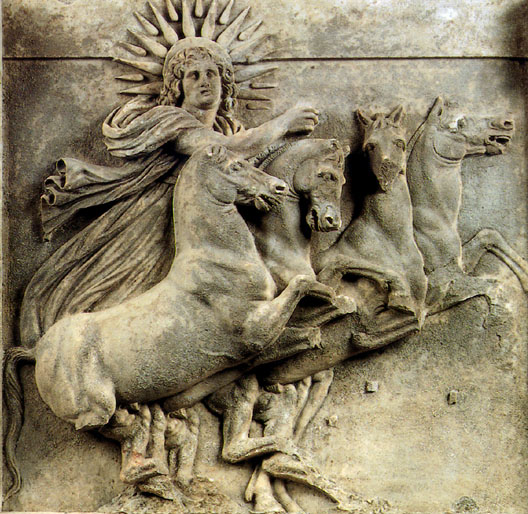|
As to the million forms, it's more like a million names, and
sometimes the observer struggles to understand why the solar disk
has a different name than the sun god, and why the name changes
depending on the time of day.
It didn't 'take.' The existing priests in Egypt made their living
from polytheism and resented this new upstart religion. It was bad
for business. It is intriguing to wonder what the relationship is between this outburst
of monotheism, fleeting as it was, and the presence in Egypt of a
large number of persons with a monotheistic heritage, the Hebrew
slaves. Unfortunately there is no commonly agreed-upon date for the
Exodus; depending on what date one adopts, the Hebrew slaves had
either been gone for a century before Akhenaten or hadn't left yet.
It doesn't seem their practice of their ancestral religion was
entirely continuous and uncorrupted. Joshua, speaking to the children of
Israel, explains that their ancestors long ago were polytheists:
"Your fathers, including Terah, the father of Abraham and the father
of Nahor, dwelt on the other side of the River in old times; and
they served other gods." (Joshua 24:2).
Terah we know. But he goes on to say, the
problem is not limited to the people of long ago:
"Now therefore, fear the Lord, serve Him in sincerity
and in truth, and put away the gods which your fathers served on the
other side of the River and in Egypt. Serve the Lord! And if it
seems evil to you to serve the Lord, choose for yourselves this day
whom you will serve, whether the gods which your fathers served that
were on the other side of the River, or the gods of the Amorites,
in whose land you dwell." (Joshua 24:14-15).
It seems like it's possible some of the people either apostatized
in Egypt, or at a minimum blended their religious practices with
those of the people around them. But there must have been enough
old-timers who still had the faith of Israel. It cannot be that the
Egyptians had never heard of monotheism and invented it for
themselves, when they had dwelling in their midst millions of
persons with a vivid recollection of practicing monotheism.

Transportation
The Egyptians depict falcon-headed Ra transporting the solar disk
across the sky in his daily progression in a bark, a small boat.
His name at any given moment depends on what way-station he has made
it to The Greeks and Romans gave him a four-horse chariot, a
quadriga:
|


